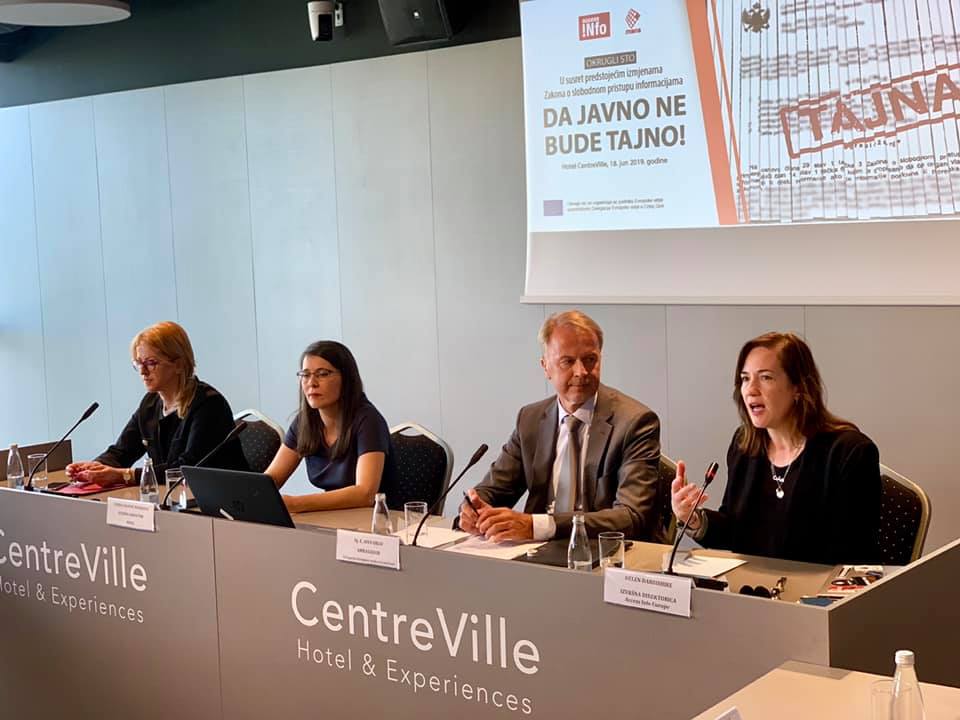Attn: Montenegro’s Working Group on Law on Free Access to Information
This letter is to express serious and urgent concerns about the proposed amendments to Montenegro’s Montenegrin Law on Free Access to Information.
The majority of the proposed changes would be negative, and would take Montenegro further away from international standards on transparency, and would result in a law that is in direct violation of Montenegro’s commitments, including its ratification of the Council of Europe Convention on Access to Official Documents.
Even where the changes do are not regressive, they fail to improve the law to bring it into line with international standards. These are not the advances on transparency that Montenegro has pledged to make as a member of the Open Government Partnership.
Access Info Europe, a specialist international access to information organisation, is currently conducting a detailed analysis of the proposed changes.
In the meantime, we submit this letter of urgent concern to highlight the main issues.
Proposed revision to Article 1
The proposed changes are a step in the right direction, but still contain two serious blanket limitations on the right, namely with a broad exclusion for information classified by the intelligence and security services, and an unusual and remarkably broad exception for any information shared with international bodies and/or third countries that the government has chosen to mark as classified.
Without proper assurances that classified information will be reviewed upon receipt of a request, this provision opens the door to abuse of the classification system to hide information that is simply politically inconvenient rather than likely to cause harm to a legitimate interest such as national security or international relations.
Proposed new Article 7a
The provisions on abusive requests are unacceptable as the definition of “unreasonable” requests is far too vague.
The provision on one applicant making frequent requests for the identical information may be acceptable although it should be clear that “frequent” means a large number of times, not just repeating a request that for technical reasons did not prosper the first time around. It should also be clear that if information has already been provided but that it may have changed (for example, and active database) this should not count as a repeat request.
The provision prohibiting request for “too much information” is extremely worrisome and is out of line with international standards and practice. There are far better legislative and practical solutions to voluminous requests, which include negotiated solutions, providing information over time, and so on. Access Info will provide language suggestions.
What is unacceptable is to bring in the criterion of “would hinder the authority’s ability to function properly”. Any public authority with a half-decent information management system should be able to handle requests for somewhat large quantities of information. This is particularly true in the digital age.
Proposed amendments to Article 9
The definition of the information to which the law applies would be narrowed in a highly problematic way if this provision were to be adopted. Specifically, the new language contains the clause “which is of public importance” opens the door to excluding much information from public access at the mere whim of a public official who decides that it is not of public importance.
Hence, while the broadening of the definition to make clear that information can be recorded in any format is positive, this provision seriously undermines the entirety of Montenegro’s access to information regime, and runs directly counter to international standards (Council of Europe, European Union, UN Human Rights Committee, OSCE, etc.) which make clear that the right of access to information applies, prima facie, to all information possessed by public bodies, regardless of its origins.
Only once this broad right of access has been established, may limitations be invoked, and only then provided that these limitations are subject to strong harm and public interest tests.
Proposed revisions of Article 14
It is of concern that the limitations to be contained in Article 14 include intellectual property. That is not in and of itself a legitimate reason for not providing information (although it may place some limits on how it can be reused). See, inter alia, the Council of Europe Convention on Access to Official Documents.
Access Info Europe has previously (June 2018) recommended to the Montenegrin Government to revise Article 14 to make clear that protection of commercial and business interests is a legitimate exception but that it must be subject to the harm and public interest test. We also stated that “Intellectual property is not, per se, a ground for refusing access, even if it may limit use/reuse of certain information.” It is not clear why more has not been done to evaluate this recommendation and to propose a reform in line with international standards.
The new Article 14.8 is another provision which risks seriously weakening the Law on Free Access to Information by providing any other law to establish exceptions. It must be made clear that international standards do not permit limitless grounds for exceptions but only those that are necessary in a democratic society, and that list has been agreed upon by the members of the Council of Europe, of which Montenegro is one. This new provision should be eliminated.
Access Info has also previously recommended to ensure that the harm test applies to every single exception, and we call upon the working group to amend the current proposal so that this is achieved. To fail to do this means that the law falls against international standards in some of its core aspects.
Statement prepared by Access Info Europe
Submitted to Montenegro’s Working Group by on the Law on Free Access to Information
Helen Darbishire, Vice President and Executive Director
Madrid, 23 September 2019




